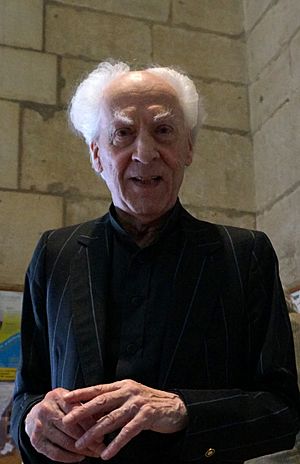Jean Guillou facts for kids
Quick facts for kids
Jean Guillou
|
|
|---|---|

Guillou in 2014
|
|
| Born |
Jean Victor Arthur Guillou
18 April 1930 Angers, France
|
| Died | 26 January 2019 (aged 88) Paris, France
|
| Education | Paris Conservatoire |
| Occupation |
|
| Organization |
|
Jean Victor Arthur Guillou (born April 18, 1930 – died January 26, 2019) was a famous French composer, organist, pianist, and teacher. He was the main organist at Saint Eustache church in Paris for many years, from 1963 to 2015.
Guillou was well-known for writing music for the organ, as well as for other instruments and voices. He was also an amazing improviser, meaning he could create music on the spot. He also gave advice to people who built organs. For decades, he taught special music classes called master classes in Zurich and Paris.
Contents
Jean Guillou's Musical Journey
Jean Guillou was born in Angers, France. He started learning piano and organ at a young age. By the time he was 12, he became the organist at St. Serge church in Angers.
He later studied at the famous Paris Conservatoire. There, he learned from important musicians like Marcel Dupré, Maurice Duruflé, and Olivier Messiaen.
Early Career and First Compositions
In 1952, while still a student, Guillou performed his own version of The Musical Offering by Johann Sebastian Bach on the organ. This was a big event in Montreal, Canada.
In 1955, he became a professor of organ and composition in Lisbon, Portugal. During this time, he wrote some of his first musical pieces.
After a period of medical treatment in Berlin, he moved there in 1958. For the next five years, he wrote many works and made his first recordings. He also met composer Max Baumann, who wrote organ pieces especially for Guillou to perform.
Becoming a Main Organist
In 1963, Guillou returned to Paris. He was chosen to be the main organist at Saint-Eustache church. This was a very important position. He held this role for 52 years, until March 2015.
He performed his first concert at the Berliner Philharmonie in 1966. He played a piece by Max Reger. Later that year, he performed his own organ work, Pour le Tombeau de Colbert, for the first time in Berlin.
Worldwide Performances and Organ Building
Jean Guillou was famous around the world as a concert organist. He was also known for his incredible improvisations. He often played the piano too. He was the first to perform Julius Reubke's Piano Sonata in B-flat minor in England and France.
Guillou was also interested in how organs were built. He worked with several organ builders to create new instruments. Some of these new organs are in the Tonhalle in Zurich and the Auditorio de Tenerife.
Compositions and Recordings
Guillou wrote over 90 musical works. These included pieces for organ, chamber music (for small groups of instruments), and orchestral music. He also made many organ versions of other composers' works.
His music was published by well-known companies like Éditions Alphonse Leduc and Schott Music. He also released more than 100 recordings. These recordings included all the organ works of Johann Sebastian Bach, César Franck, and Robert Schumann. He also recorded many of his own improvisations and organ compositions.
Some of Guillou's compositions were based on his own poems and writings. He also published several books, which were translated into other languages. These books included L'Orgue – Souvenir et Avenir (The Organ – Memory and Future) and La Musique et le Geste (Music and Gesture).
Teaching and Awards
From 1970 to 2005, Guillou taught organ playing and improvisation at special classes in Zurich. Later, these classes were held in Paris. Many students learned from him, including Zsuzsa Elekes and Bernhard Haas.
In 2015, he became an honorary professor at the Hochschule für Musik Saar in Saarbrücken, Germany. In 2018, he received the RCO Medal from the Royal College of Organists in London. This award recognized his great achievements in organ playing and composing.
Jean Guillou's Passing
Jean Guillou passed away in Paris on January 26, 2019. His funeral service was held at Notre-Dame de Paris church. He was buried in the Père Lachaise Cemetery in Paris.
More About His Music
See also
 In Spanish: Jean Guillou para niños
In Spanish: Jean Guillou para niños
 | William Lucy |
 | Charles Hayes |
 | Cleveland Robinson |

